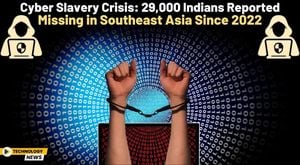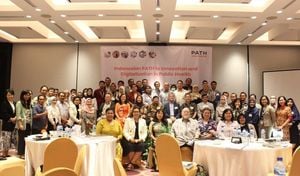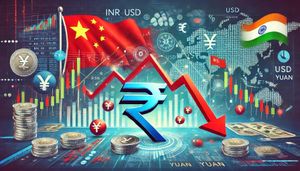North Korea is making headlines once again, as reports emerge detailing the deployment of approximately 10,000 North Korean troops to Russia, particularly around the Kursk region near the Ukrainian border. The Pentagon officially confirmed this concerning development, with Defense Secretary Lloyd Austin emphasizing the potential for these troops to engage directly in combat against Ukrainian forces.
Earlier this month, North Korean leader Kim Jong Un expressed his intentions to solidify relations with Russian President Vladimir Putin, dubbing him as his "closest comrade." This remark has now gained substance with the confirmed troop movements, marking the first time North Korean forces will be involved directly on the battlefield alongside Russian soldiers during the two-and-a-half-year conflict with Ukraine.
This increasingly intimate military alliance raises various questions about the future dynamics of the conflict. A Pentagon spokesperson, Major General Pat Ryder, noted the likelihood of some North Korean troops already engaged on the ground, with the possibility of thousands more arriving shortly. Such collaboration not only signifies Pyongyang's commitment to aiding Moscow but also presents substantial complications for Ukraine as it continues its counter-offensive against Russian forces.
A source with insights on the situation revealed to CNN about the Turkish military's struggles to find sufficient commanders for these new troops. Recently intercepted communications from Russian soldiers exposed doubts about the operational readiness and support available for the incorporated North Korean units. Remarkably, during these calls, soldiers expressed their frustrations, illustrating the chaos surrounding this integration.
According to experts, this substantial troop commitment from North Korea is more than mere symbolism, with many analysts seeing it as Russia's desperate need for additional manpower. The deployment of these North Korean forces is perceived as Russia's attempt to mitigate its losses as it deals with intensified Ukrainian offensives. Reports indicate the presence of North Korean logistics and support roles, which could play significant roles behind the front lines.
With various military experts weighing in on the deployment, there's considerable debate about what role these troops may fulfill. Initial analyses suggest they might be fielded primarily for infantry duties, as per intelligence assessments. Yet, there’s consensus among scholars like Justin Hastings, International Relations professor at the University of Sydney, who posited the likelihood of these troops supporting non-combat functions due to their extensive training and logistical challenges.
China's relationship with both North Korea and Russia adds another layer of complexity. Officials believe there may be strategic benefits for North Korea as it seeks advanced military technology from Russia, such as reconnaissance satellites, nuclear submarine advancements, and possibly tactical nuclear capabilities. South Korean defense officials recently raised alarms about the potential for North Korea's requests to correlate directly with its troop deployment to Russia, traveling extensively to align with Russia's strategic needs.
The ethical dimensions surrounding this joint military endeavor are controversial. Russia defended its troop agreements with North Korea during recent discussions at the U.N., contending such actions are consistent with international law. Yet, many Western nations vehemently disagree, labeling the military cooperation as violations of various U.N. resolutions concerning North Korea.
Strategically, some United States officials have hinted at repercussions should North Korean soldiers engage Ukrainian forces. White House spokesperson John Kirby articulated the future military engagement with any North Korean troops as "fair game" targets for Ukraine, which raises serious international relations questions and signals broader engagement possibilities.
Reflecting on the potential escalation of the conflict, some experts suggest this new alliance might embolden other global actors to engage, not only within the Ukrainian theatre but possibly elsewhere. Austin acknowledged this as something alarming, recognizing the risks such deployments carry for wider international repercussions.
While the North Korean troop deployment marks significant political maneuvering, the inevitable challenges of integration loom large. The underlying issues stem from the historical animosity and rivalry between North and South Korea, alongside the recent three-way relationship dynamics involving Russia and Ukraine. Observers note how the chaos reported through intercepted calls and the potential for command inefficiencies could significantly impact the battlefield conditions.
With the demand for coordination even more pressing, both North and South Korean officials are vigilant. South Korean Defense Minister Kim Yong-hyun disclosed how their intelligence-sharing with NATO allies has ramped up, showing signs of how international partnerships could evolve amid increasing tensions.
The global geopolitical chessboard is changing rapidly, and as events continue to evolve, the deployment of North Korean troops to Russia serves as one of the newest players introduced to this enduring conflict. With rising stakes and mounting concerns, the world watches closely to see how this development will influence the conflict not just between Ukraine and Russia but for Northeast Asia as well.



